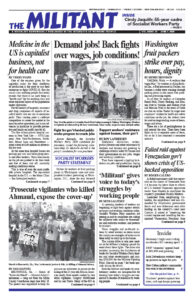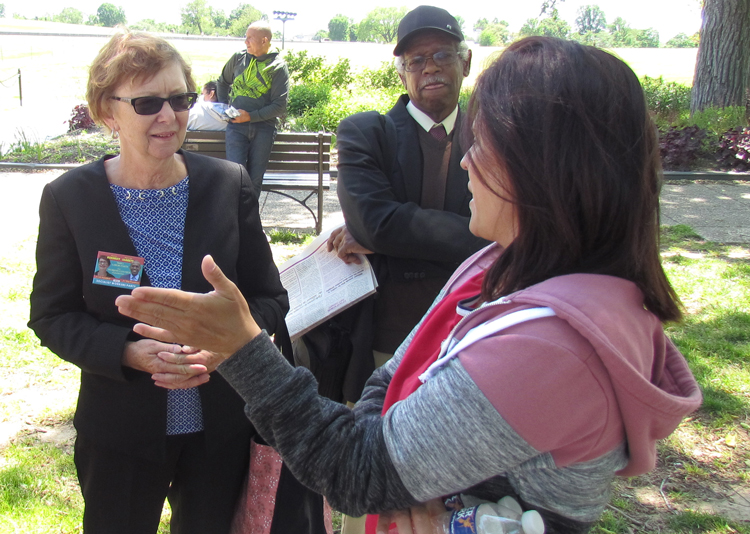WASHINGTON — Now in its third week, over 300 truckers are protesting here with their rigs lining both sides of Constitution Avenue near the U.S. Capitol — twice as many as a week ago. The drivers demand relief from low freight rates imposed by brokers they have to get jobs from, onerous government regulations and worsening conditions.
Markcus Davis, his wife and two children drove here from Orangeburg, South Carolina. “We are fighting for the respect we need and deserve,” the 26-year veteran trucker told the Militant. “We’ve come together and we are staying together. I believe the media has been told not to cover our story, because of the support we can get.”
On May 14 a sister rally in Sacramento, California, was organized by the Punjabi Trucking Association. “Ten rigs were parked, truckers lined the streets with signs and others organized a drive-through,” said Tony Singh, a member of the group from Richmond, Virginia, who is part of the protest here. A solidarity protest of some 40 truckers also took place in Austin, Texas, May 15.
Many independent owners face bankruptcy under conditions where brokers — who get orders from shippers and then offer the run to the truckers — dictate rates as low as possible to boost their own profits.
“You can only go into debt for so long,” Singh, a driver who runs a small trucking company, told the Militant. So-called “grace periods” are ending. They were offered by insurance companies for March and April, because of the drastic fall in trucking jobs due to government lockdowns that shuttered production and shipping. “I’m supposed to pay $37,000 in insurance by the end of the week,” Singh said.
Elizabeth Williams from Green Bay, Wisconsin, joined the protest. She has been driving for over 20 years. “On my last two trips to the East Coast I drove back empty. I refuse to take a load for less then 80 cents a mile. They were offering me 59,” she said. “What the brokers are taking is ridiculous.”
Another major issue is government red tape. The owner-operators say they can operate safely, without government regulation.
“We want some control over how we run things,” said Wisconsin independent trucker and former dairy farmer Lee Schmitt. He said the mandatory Electronic Logging Device “is an ankle bracelet in my truck,” comparing the device to prison GPS electronic monitors.
“Every year there’s a new regulation,” independent operator Mike Strange told Fox 7 in Austin. “It started with the logging device. This year it’s the Drug and Alcohol Clearinghouse.”
This is a new database set up by the Federal Motor Carrier Safety Administration in January that requires all owner-operators to post records of any drug or alcohol infractions.
“You have to join it. I have to purchase a report from the government about myself,” Strange said. “If you don’t, you can get closed down.”
The carrier administration also regulates how many hours drivers can work, another regulation they hate. It’s currently suspended, but that ends June 14. The suspension should be permanent, Elizabeth Williams said. “We know how to do the job safely.”
The drivers say they aren’t going anywhere anytime soon.
James Harris from Washington, D.C., and Tony Lane from Pittsburgh contributed to this article.


